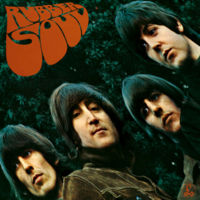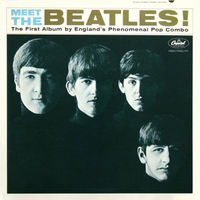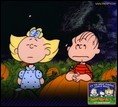Some time ago, I issued a request to iTunes to do more with visuals in their program. I reflected that where much has been gained, for many (though not all), in having immediate electronic access to music, something has also been lost, since the CD era, in the way of album art. I opined that iTunes had the technology to return us to the days when pouring over album covers was as vital to the experience of listening to music as pricking the lint off the needle before laying it on the turntable.
My call has since been answered (lint-free!), as you can not only retrieve album art from music you have already purchased (from a button in “Advance” preferences), but can also – as I specifically advised at that time – click the thumbnail on the bottom left of the screen so that the album cover takes up another window in your monitor.
You’re welcome. (Yeah, as if I had anything to do with it.)
But I had also mentioned in that post how Beatles music had yet to be released online, what with Capitol records, the purveyor of Beatles music from 1964 to 1968, milking its devoted fan base of every possible dollar through every conceivable reissue of Beatles music (cf., One); and the remaining Beatles being as parsimonious with electronic editions of their music as they are profligate with lawsuits to “protect their brand."
Well, I can’t speak for Paul and Ringo, but Capitol has gone and done it again, this time with a reissue of the Beatles albums issued on Capitol records in the States – that is, *as they were issued in the States. As any hardcore Beatles fan will tell you, up until Revolver, released in 1966, the Beatles albums issued in America – the long plays, or LPs – differed in content from the extended plays, the EPs, issued in Britain. Naively, I used to think it had something to with “album technology” (or something like that) in each country. But no, the system American record companies used to tally up music royalties differed fundamentally from the system that English record companies used. It’s the economy, stupid. Hence different releases (and more specifically, shorter American LPs than British EPs).
Hardcore Beatles fans will also tell you that that’s how the most prized item of Beatles paraphernalia – the “butcher cover,” as it’s known – came about. That is, by 1966, the Beatles had already issued a store of songs on EPs in the U.K. that hadn’t been issued in the U.S. To (er) capitalize on this trove, Capitol released all of those songs on one album, Yesterday and Today, and the Beatles, gruesome wits, shot the album cover sitting in butcher coats stained with blood and laden with dismembered baby dolls and other gross offal -- a statement on how their own music was being pieced apart and reconstituted (check out the menace on George's face!).
 As this album appeared not long after the flap over “we’re bigger than Jesus,” Capitol records, upon receiving droves of complaints from offended parents, reissued the album under another (sublimely benign) album cover. So few “butcher covers” went into circulation that it remains the Holy Grail among Beatles collectors.
As this album appeared not long after the flap over “we’re bigger than Jesus,” Capitol records, upon receiving droves of complaints from offended parents, reissued the album under another (sublimely benign) album cover. So few “butcher covers” went into circulation that it remains the Holy Grail among Beatles collectors.
I wish I could slam Capitol over their latest release, but I can’t. You see, American fans such as myself discovered and experienced the Beatles in the Capitol format. But when Beatles albums were initially remastered and issued digitally on CD, they were reissued according to the British EP releases on Parlophone. After all, CDs could contain that much information (not that albums couldn’t do so all along . . .).
 But how could I ever listen to Rubber Soul without “I’ve Just Seen a Face” launching the album, that brisk and thrombing acoustic guitar leading into Paul’s plucky faux-country voice? The U.K. Rubber Soul begins with “Drive My Car.” Catchy. Still a crowd-pleaser (Paul played it at the Super Bowl). But that song –- a single (a corporate choice) -- doesn’t compare to the innovative, post-Dylan-goes-electric intro of “I’ve Just Seen a Face” (which appeared deep into the Help! album in the U.K.). It’s been years since I cued up one of my old scratchy Beatles albums, and I’ve tried to grow accustomed to the Parlophone versions – the British version of Help!, for example (with “I’ve Just Seen a Face”), is my favorite among those editions; and I’ve used the playlist function on iTunes (having ripped those CDs) to rearrange songs in the order I know them.
But how could I ever listen to Rubber Soul without “I’ve Just Seen a Face” launching the album, that brisk and thrombing acoustic guitar leading into Paul’s plucky faux-country voice? The U.K. Rubber Soul begins with “Drive My Car.” Catchy. Still a crowd-pleaser (Paul played it at the Super Bowl). But that song –- a single (a corporate choice) -- doesn’t compare to the innovative, post-Dylan-goes-electric intro of “I’ve Just Seen a Face” (which appeared deep into the Help! album in the U.K.). It’s been years since I cued up one of my old scratchy Beatles albums, and I’ve tried to grow accustomed to the Parlophone versions – the British version of Help!, for example (with “I’ve Just Seen a Face”), is my favorite among those editions; and I’ve used the playlist function on iTunes (having ripped those CDs) to rearrange songs in the order I know them.
(Sidebar: There was much talk that the iPod and its technology -- the shuffle feature -- destroyed the album as a genre, because albums were no longer allowed to tell a story, from one choice beginning to an equally deliberate end. I harumphed at that critique, as I organized my iPod according to album, and didn’t turn on the shuffle. Fret not, rock snobs: your Led Zep II can remain intact.)
But rediscovering all the Beatles songs (not every song was issued on Parlophone either), and in the order in which I first heard them, has been a delirious diversion bordering on the sublime.
 This is especially the case for the very first albums issued, or those collected in “The Capitol Albums, Vol. 1.” Of these, “The Second Album” stands out for one rip-roaring rock performance after another. Meet the Beatles, the one with that iconic image of the Beatles’ faces in half shadow, contains those songs that had been written and produced under the watchful ear of producer George Martin (late of the Goon Show and BBC Classical records: the perfect blend of experience for his witty and musically curious protégés). These are the sunny pop tunes we all know: “I Want to Hold Your Hand”; “I Saw Her Standing There”; “All My Loving.”
This is especially the case for the very first albums issued, or those collected in “The Capitol Albums, Vol. 1.” Of these, “The Second Album” stands out for one rip-roaring rock performance after another. Meet the Beatles, the one with that iconic image of the Beatles’ faces in half shadow, contains those songs that had been written and produced under the watchful ear of producer George Martin (late of the Goon Show and BBC Classical records: the perfect blend of experience for his witty and musically curious protégés). These are the sunny pop tunes we all know: “I Want to Hold Your Hand”; “I Saw Her Standing There”; “All My Loving.”
 For The Beatles' Second Album, Capitol reached into that repertoire of songs – largely covers – the Beatles had played for years in the Cavern Club in Liverpool, and mastered during their punishing shift on the Reeperbahn (which is to say, playing squalid strip clubs) in Hamburg, Germany. On Meet the Beatles, the band sounds eager. On The Second Album, the Beatles sound hungry. (And when do we ever hear appetite in a sophomore release these days? If a band has made it that far, they're taxing our patience with ho-hum laments on the price of fame.) Choice cuts: George's punchy rendition of "Roll Over Beethoven" (the first track, a dynamite intro); John's throaty growl in "Money" ("that's. . . what I want!"); and Paul's tenor holler in "Long Tall Sally" (sorry, Ringo fans, no token track here); each tune firmly driven by John's pulsing rhythm guitar (fret work for which he received little credit).
For The Beatles' Second Album, Capitol reached into that repertoire of songs – largely covers – the Beatles had played for years in the Cavern Club in Liverpool, and mastered during their punishing shift on the Reeperbahn (which is to say, playing squalid strip clubs) in Hamburg, Germany. On Meet the Beatles, the band sounds eager. On The Second Album, the Beatles sound hungry. (And when do we ever hear appetite in a sophomore release these days? If a band has made it that far, they're taxing our patience with ho-hum laments on the price of fame.) Choice cuts: George's punchy rendition of "Roll Over Beethoven" (the first track, a dynamite intro); John's throaty growl in "Money" ("that's. . . what I want!"); and Paul's tenor holler in "Long Tall Sally" (sorry, Ringo fans, no token track here); each tune firmly driven by John's pulsing rhythm guitar (fret work for which he received little credit).
Capitol also upped the ante by packaging the set so that each CD comes in its own mini-album cover, wholly duplicated from the original -- from the dingy earthtones, to the punchy 60s graphics, to the hilarious cover copy itself: "Electrifying big-beat performances!" "Never before has show business seen and heard anything like them!" Show business! What a hoot. Capitol’s efforts to reproduce the album experience, even on a mini/digital scale, detracts from the cynicism of its entire reissue enterprise.
So to those of you reticent to shell out yet again for yet another Beatles disc (each volume runs around US$60), I say: you’re excused. Shell away. And to iTunes I say again: are you listening?



